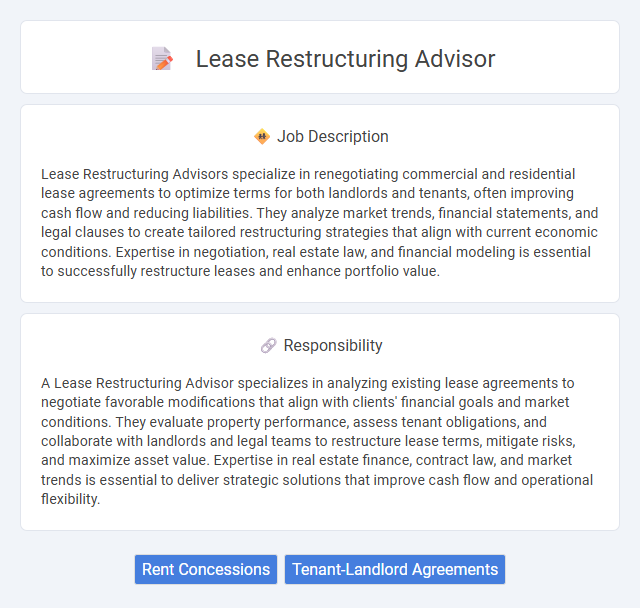
Lease Restructuring Advisors specialize in renegotiating commercial and residential lease agreements to optimize terms for both landlords and tenants, often improving cash flow and reducing liabilities. They analyze market trends, financial statements, and legal clauses to create tailored restructuring strategies that align with current economic conditions. Expertise in negotiation, real estate law, and financial modeling is essential to successfully restructure leases and enhance portfolio value.
Individuals with strong analytical skills and a solid understanding of real estate finance are likely suitable for a Lease Restructuring Advisor position. Those who demonstrate proficiency in negotiation and can navigate complex lease agreements may find this role well-aligned with their strengths. Candidates lacking attention to detail or effective communication abilities might struggle to meet the demands of this job.
Qualification
Lease Restructuring Advisors must possess strong analytical skills and expertise in commercial real estate finance, including proficiency with lease accounting standards such as ASC 842 and IFRS 16. A background in financial modeling, negotiation, and contract law is essential to effectively modify lease terms and improve client financial positions. Advanced degrees in finance, real estate, or business administration, combined with relevant certifications like CPA, CFA, or CRE, enhance the advisor's qualifications and credibility in the field.
Responsibility
A Lease Restructuring Advisor specializes in analyzing existing lease agreements to negotiate favorable modifications that align with clients' financial goals and market conditions. They evaluate property performance, assess tenant obligations, and collaborate with landlords and legal teams to restructure lease terms, mitigate risks, and maximize asset value. Expertise in real estate finance, contract law, and market trends is essential to deliver strategic solutions that improve cash flow and operational flexibility.
Benefit
A Lease Restructuring Advisor likely improves financial outcomes by negotiating more favorable lease terms and reducing liabilities for clients. They probably enhance cash flow and operational flexibility, increasing the probability of long-term business sustainability. Their expertise may also help mitigate risks associated with lease agreements, potentially leading to stronger financial stability.
Challenge
Lease restructuring advisors likely face the challenge of navigating complex negotiations between landlords and tenants to achieve mutually beneficial agreements. They probably need to analyze financial data and market trends accurately to propose viable restructuring options under uncertain economic conditions. Managing conflicting interests and adapting quickly to regulatory changes may also be significant hurdles in this role.
Career Advancement
Lease Restructuring Advisors specialize in optimizing lease agreements to enhance financial performance and operational efficiency for clients. Mastery in negotiation, financial analysis, and market trend assessment positions professionals for rapid career growth into senior advisory roles or executive management within real estate and finance sectors. Continuous skill development in contract law and innovative restructuring strategies drives advancement opportunities and increased earning potential.
Key Terms
Rent Concessions
Lease Restructuring Advisors specialize in negotiating rent concessions to optimize lease terms for both landlords and tenants, ensuring financial stability during economic fluctuations. Their expertise in market analysis and legal frameworks helps secure favorable reductions, deferrals, or abatements that align with current market conditions and tenant capabilities. By managing rent concessions effectively, they enhance tenant retention and improve overall portfolio performance for property owners.
Tenant-Landlord Agreements
Lease restructuring advisors specialize in renegotiating tenant-landlord agreements to optimize lease terms, reduce rental expenses, and enhance occupancy stability. Their expertise includes assessing current lease contracts, identifying potential areas for adjustment, and facilitating mutually beneficial modifications to terms such as rent amounts, lease duration, and maintenance responsibilities. By aligning lease agreements with market conditions and tenant financial capabilities, they support both parties in achieving sustainable and flexible occupancy solutions.
 kuljobs.com
kuljobs.com